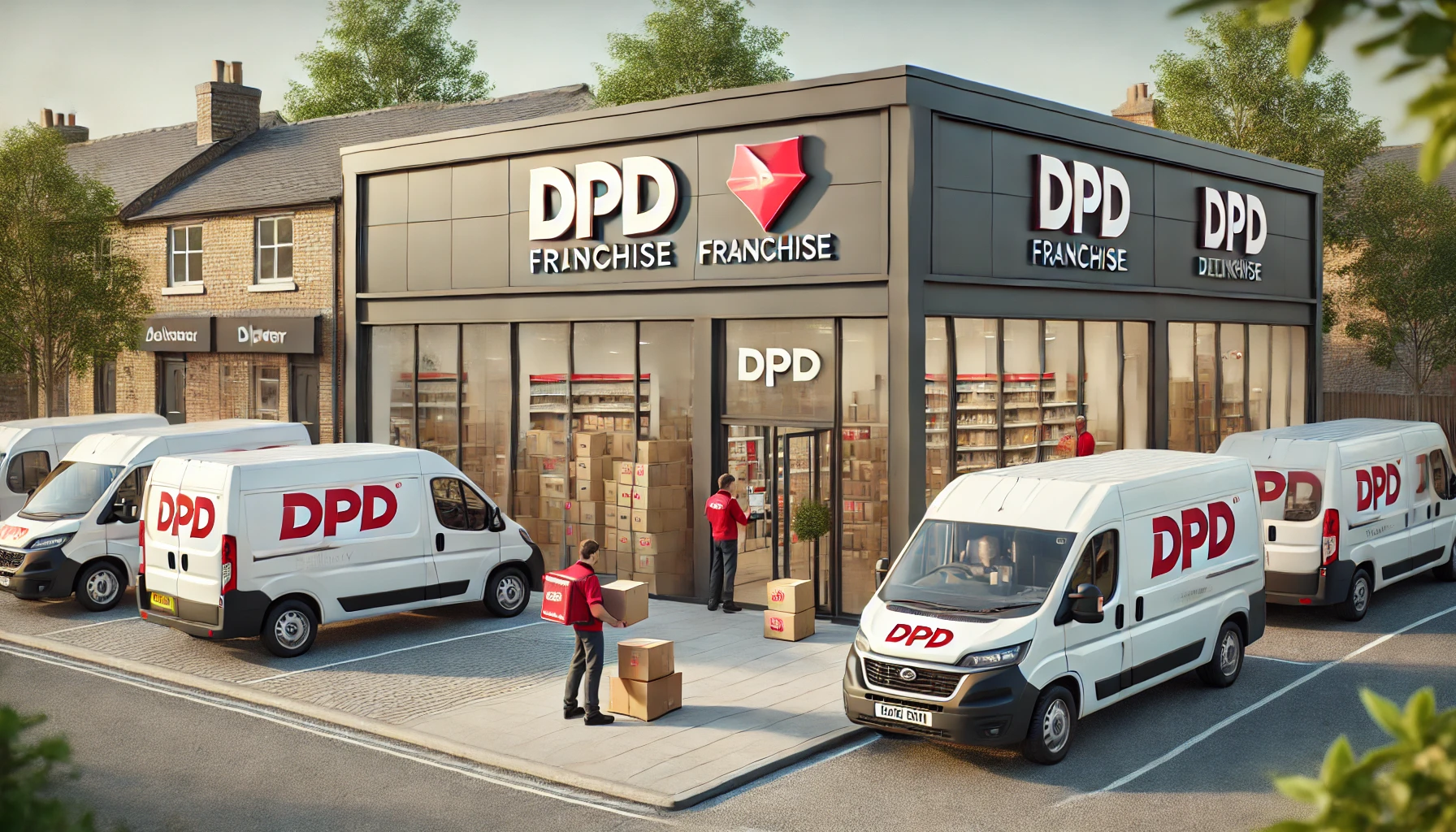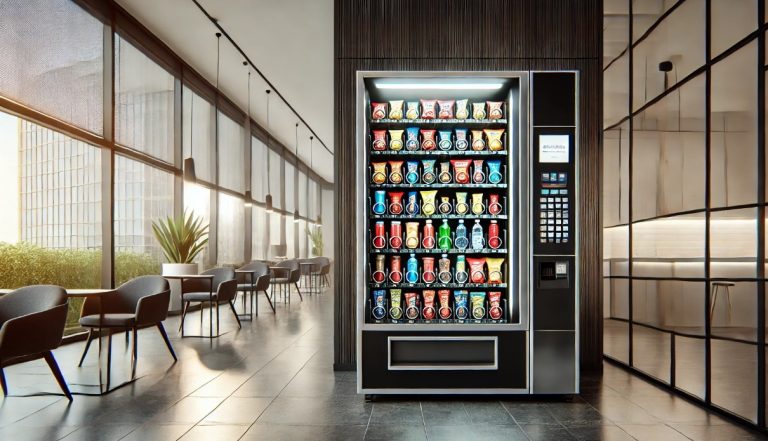DPD Franchise Cost in 2025: Investment, Fees & Profit Potential
Are you considering starting your own parcel delivery business? With the continuous rise in e-commerce, the demand for efficient courier services has never been higher.
A DPD franchise offers an opportunity to enter this booming industry with low start-up costs and high earning potential. But what does it really take to become a DPD franchise owner?
Understanding the cost, investment requirements, and profitability is crucial before making a decision. How much do you need to invest? What kind of training and support does DPD provide? And most importantly, how much can you earn?
In this guide, we’ll break down the DPD franchise cost, fees, earning potential, and key benefits, helping you determine if this is the right business opportunity for you in 2025.
What is the History of DPD?
DPD (Dynamic Parcel Distribution) has grown into one of Europe’s leading courier services, but its journey began in 1970 under a different name.
Originally founded as Courier Express, the company quickly expanded, leading to its acquisition by Mayne Nickless, an Australian logistics firm, in 1984. Following this, it was rebranded as Parceline and continued to strengthen its presence in the UK.
In 2000, France’s La Poste, Europe’s second-largest postal service, acquired Parceline and integrated it into its global delivery network. Shortly after, the brand was renamed DPD to align with La Poste’s international expansion strategy.
The DPD franchise model emerged to support the growing demand for parcel deliveries, especially with the rise of e-commerce. Today, DPD operates in over 230 countries, with a strong franchise network offering flexible delivery solutions across the UK and beyond
What is the DPD Franchise and How Does It Work?
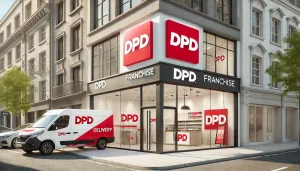
DPD offers a well-established franchise model, allowing individuals to become owner-driver franchisees. This opportunity enables you to operate your own parcel delivery business while benefiting from DPD’s strong brand reputation and industry-leading technology.
There are two franchise options:
- Owner-Driver Franchise (ODF): A full-time role where you manage deliveries five days a week, with the flexibility to extend your working hours.
- Owner-Driver Franchise Lite (ODF Lite): A part-time option that offers more flexibility, ideal for those looking for a secondary income stream.
Franchisees handle parcel collections and deliveries using DPD’s Predict system, which optimises routes and provides real-time tracking.
Payments are made every four weeks, and after three months, you can expand by taking on additional routes. With a five-year renewable contract, the DPD franchise offers a scalable business model for long-term growth.
Why Should You Start a DPD Franchise?
Investing in a DPD franchise is an excellent opportunity for aspiring entrepreneurs looking to enter the logistics and courier industry. With the rise in e-commerce, parcel delivery services are in high demand, making this franchise a stable and scalable business.
Key Reasons to Start a DPD Franchise:
- Low Start-Up Costs: The initial deposit ranges between £1,000 – £2,400, making it more affordable than many logistics franchises.
- High Earning Potential: Successful franchisees earn £140,000 – £170,000 annually after three years.
- Flexible Work Schedule: Choose your working days and increase your hours if desired.
- Strong Brand Reputation: DPD is an industry leader, trusted by major retailers like Apple, John Lewis, and Marks & Spencer.
- Advanced Technology: The Predict and Follow My Parcel systems optimise delivery efficiency.
- Business Growth Opportunities: After three months, franchisees can expand their routes and increase earnings.
- Ongoing Support & Training: Comprehensive training and depot support teams ensure operational success.
With consistent demand for parcel deliveries and low operational risks, a DPD franchise is a profitable and future-proof business opportunity.
How Much Does a DPD Franchise Cost in 2025?
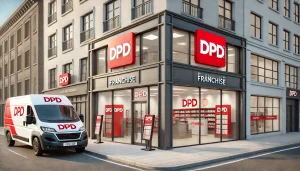
Starting a DPD franchise in 2025 requires an initial investment that varies based on the franchise model you choose. The total investment isn’t publicly disclosed (POA – Price on Application), but the minimum upfront cost is relatively low compared to other logistics franchises.
Investment Breakdown:
| Investment Component | Owner-Driver Franchise (ODF) | Owner-Driver Franchise Lite (ODF Lite) |
| Deposit Requirement | £1,400 – £2,400 | £1,000 |
| Franchise Fee | £400 | £400 |
| Vehicle Costs | Own or lease a van | Own or lease a van |
| Ongoing Fees | None stated | None stated |
Additional Costs:
- Vehicle expenses: If you don’t own a suitable van, leasing or purchasing one will add to your initial costs.
- Insurance: Franchisees need commercial vehicle insurance.
- Fuel & Maintenance: Regular vehicle upkeep is essential to keep operations running smoothly.
- Uniform & Equipment: DPD provides a uniform and access to technology for route planning.
With earnings potential between £140,000 and £170,000 annually after three years, the DPD franchise offers a cost-effective entry into the courier industry.
What Are the Requirements to Start a DPD Franchise?
To qualify for a DPD franchise, you need to meet specific requirements that ensure you can efficiently manage parcel deliveries. While prior experience in logistics is not mandatory, certain financial, legal, and operational conditions must be fulfilled.
Key Requirements for Franchise Applicants:
| Requirement | Details |
| Driving Licence | Full UK driving licence with minimal penalty points. |
| Age Requirement | Must be at least 21 years old. |
| Financial Investment | Ability to pay the required deposit (£1,000 – £2,400) and franchise fee (£400). |
| Vehicle Ownership | Must own or lease a van that meets DPD’s specifications. |
| Work Eligibility | Right to work in the UK. |
| Business Registration | May need to register as self-employed or a limited company. |
Other Considerations:
- Time Commitment: Full-time owner-driver franchisees typically work five days a week, while Lite franchisees have flexible hours.
- Customer Service Skills: As the face of DPD, franchisees should provide excellent customer service.
- Ability to Load & Manage Parcels: Franchisees are responsible for handling and securing packages in their vehicles.
With these requirements in place, DPD ensures that franchisees are fully prepared to operate a successful courier business.
How Profitable is a DPD Franchise?
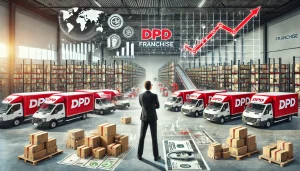
A DPD franchise offers strong earning potential, especially for those willing to expand their delivery routes over time. The company’s structured model allows franchisees to scale operations and increase revenue.
Estimated Earnings & Profit Potential:
| Time in Business | Estimated Annual Revenue |
| First Year | £35,000 – £50,000 |
| After 2 Years | £80,000 – £100,000 |
| After 3 Years | £140,000 – £170,000 |
Factors Affecting Profitability:
- Number of Routes: Franchisees can take on extra routes after three months, increasing their earning potential.
- Efficiency & Performance: Faster, more efficient deliveries result in higher revenue.
- Fuel & Vehicle Costs: Managing fuel consumption and vehicle maintenance affects profit margins.
- Customer Demand: The continuous growth of e-commerce increases the volume of parcel deliveries.
DPD’s route optimisation technology and scheduled payments every four weeks help franchisees maintain consistent earnings. With strategic planning, franchisees can build a sustainable and profitable business in the courier sector.
What Support and Training Does DPD Provide?
DPD ensures its franchisees receive comprehensive training and ongoing support to operate efficiently. The company provides both initial training for new franchisees and continuous development programs to help them scale their business.
Training Programme
- Induction Training: Covers DPD’s technology, delivery processes, and customer service expectations.
- On-Road Training: Hands-on experience with deliveries, route planning, and vehicle management.
- Technology Training: Instruction on using DPD’s Predict and Follow My Parcel systems for efficient tracking.
Ongoing Support
- Dedicated Depot Support Team: Franchisees receive daily assistance with logistics and troubleshooting.
- Route Optimisation Technology: Helps reduce travel time and improve delivery efficiency.
- Business Growth Opportunities: After three months, franchisees can expand their routes for increased earnings.
- Franchisee Events & Networking: DPD hosts regular meetings to connect franchisees with industry professionals.
With strong training and support, DPD franchisees are well-equipped to manage their courier operations successfully.
What Are the Advantages and Disadvantages of a DPD Franchise?
A DPD franchise offers significant benefits, but it’s important to weigh the pros and cons before investing.
What Are the Advantages?
- Low Start-Up Costs: Compared to other logistics franchises, DPD has a lower initial investment.
- Strong Brand Reputation: Operating under an industry leader enhances credibility.
- Growing E-commerce Market: Increased online shopping drives demand for courier services.
- Flexible Work Schedule: Franchisees can choose workdays and hours.
- Potential for High Earnings: Experienced franchisees earn between £140,000 and £170,000 annually.
What Are the Disadvantages?
- Physically Demanding Work: Lifting and loading parcels daily can be exhausting.
- Vehicle Maintenance Costs: Franchisees are responsible for fuel, repairs, and insurance.
- Market Competition: Other delivery services may impact profitability.
- Initial Learning Curve: New franchisees must adapt to delivery schedules and logistics systems.
Despite these challenges, a DPD franchise remains a lucrative opportunity for those committed to the courier business.
How to Apply for a DPD Franchise?
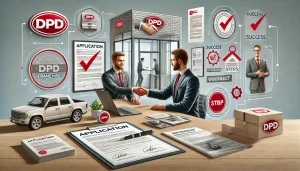
The DPD franchise application process is straightforward but requires careful preparation. Following the correct steps ensures a higher chance of approval.
- Visit the DPD Website: Apply through their official franchise application portal.
- Submit an Online Application: Provide personal details, driving licence information, and business experience.
- Attend an Interview: DPD conducts interviews to assess suitability for the franchise.
- Financial Verification: Ensure you meet the deposit and investment requirements.
- Training & Onboarding: If approved, you undergo comprehensive training before launching operations.
- Vehicle Acquisition: Secure a delivery van that meets DPD’s specifications.
- Start Operations: Begin delivering parcels, following DPD’s structured route-planning system.
How Do I Contact DPD by Phone?
If you need to get in touch with DPD, there are several ways to contact them:
- INSTANT – App Chat: The fastest way to contact DPD.
- INSTANT – Chat to Us: Chat to DPD about your delivery 24/7.
- Contact By Phone:
- Customer Service Team: 0121 275 0500
- Operating Hours:
- Mon-Fri: 8 am – 6:30 pm
- Sat: 8 am – 4 pm
- Sun: 9 am – 3 pm (excluding bank holidays)
By using these contact methods, you can quickly resolve any queries related to your DPD deliveries or franchise operations.
What Are the Common Reasons for Rejection?
- Poor driving record with multiple penalty points.
- Insufficient financial resources.
- Inability to commit to full-time operations.
By meeting DPD’s criteria, you can successfully launch your own delivery business under a trusted brand.
What Are the Alternatives to a DPD Franchise?
While a DPD franchise is a strong option in the courier industry, exploring alternative franchises can help you compare investment costs, earning potential, and operational flexibility.
Several other logistics and delivery franchises operate in the UK, offering similar or unique opportunities.
What Are the Top Alternatives to a DPD Franchise?
| Franchise | Initial Investment | Earnings Potential | Key Features |
| Hermes (Evri) Courier Franchise | £300 – £2,000 | £50,000+ annually | Flexible hours, independent courier model |
| Amazon Logistics Franchise | £10,000+ | £100,000+ annually | Operate multiple delivery routes, scalable business |
| Speedy Freight Franchise | £38,500+ | £1M+ annual turnover (established franchisees) | Focus on B2B logistics, higher investment |
| Royal Mail Delivery Franchise | £5,000+ | £40,000+ annually | Trusted postal brand, regional franchise options |
Factors to Consider When Choosing an Alternative:
- Investment Cost: Some franchises require a higher upfront investment.
- Flexibility: DPD and Hermes offer flexible work schedules, while Amazon demands full-time commitment.
- Earnings Potential: Speedy Freight offers higher revenue but requires a larger investment.
- Brand Recognition: Royal Mail and Amazon provide strong brand trust among UK customers.
DPD remains a cost-effective option for those seeking low initial investment and high scalability, but exploring alternatives can help you find the best fit for your goals.
Conclusion
A DPD franchise offers an excellent business opportunity with low initial investment, flexible working options, and strong earning potential. Whether you choose a full-time or part-time model, you benefit from DPD’s brand reputation, advanced technology, and support system.
With projected annual earnings of £140,000 – £170,000 after three years, franchisees can achieve financial stability and growth. However, success depends on commitment, efficiency, and customer service skills.
While there are some operational challenges, such as vehicle maintenance and workload, the demand for courier services continues to rise, making this a future-proof business option.
If you’re looking for a low-risk investment in the logistics industry, a DPD franchise in 2025 could be the perfect opportunity to start your entrepreneurial journey.
FAQs
How long does it take to start a DPD franchise?
The application process typically takes a few weeks, including interviews and financial checks. Training follows, and franchisees can start operations within a month.
Do I need prior experience to start a DPD franchise?
No, DPD provides full training and support, so previous experience in logistics or business management is not required. A valid UK driving licence is necessary.
Can I expand my DPD franchise in the future?
Yes, franchisees can take on additional delivery routes after three months, increasing earning potential and business growth.
What are the main challenges of running a DPD franchise?
Challenges include long hours, vehicle maintenance costs, and fuel expenses. However, efficient route planning and financial management can improve profitability.
Is a DPD franchise a long-term business opportunity?
Yes, with the growth of e-commerce and rising demand for deliveries, a DPD franchise remains a stable and scalable business.
Do I need to buy my own vehicle for the franchise?
Yes, franchisees must own or lease a van that meets DPD’s specifications. Costs vary, but leasing options are available.
How often do DPD franchisees get paid?
Franchisees receive payments every four weeks, providing consistent cash flow to manage expenses and reinvest in business growth.

